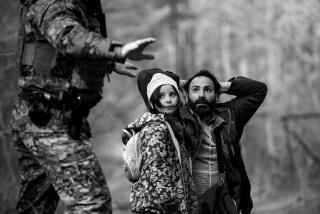Baghdad’s Green Zone: Safety inside, resentment outside
Reporting from Baghdad — — They called it the Green Zone because within its fortified blast walls lay a sanctuary for Americans, a place so secure that weapons could safely be left unloaded — or green, in military parlance.
Outside was the Red Zone, the rest of Iraq, where bombs exploded, bullets flew, ordinary Iraqis lived and endured and no American soldier or official was permitted to venture without a heavily armored convoy.
But the Green Zone now is American no longer. On Tuesday, Iraq took full control of the 4-square-mile enclave in the heart of Baghdad that, to many Iraqis, symbolized so much of what went wrong with the U.S. military presence in Iraq.
At a brief ceremony held beside a bomb-damaged palace, the battalion of U.S. military police that had been advising Iraqis at Green Zone checkpoints cased their colors and prepared to redeploy to a base near the Baghdad airport, and is to depart this summer.
It was a small first step in the impending withdrawal of nearly 50,000 U.S. troops by Sept. 1, and the end of one of the more extraordinary chapters in the still unfinished saga of America’s entanglement in Iraq.
“We are handing over to the Iraqis.... Job well done,” Army Brig. Gen. Joseph DiSalvo told the 250 or so troops standing in formation under a scorching sun. “Hoo-ah!” they replied in unison.
The U.S. military will retain a small presence in the Green Zone, to guard the U.S. Embassy and train Iraqi security forces. But Iraqis will have sole authority over security and checkpoints, said the departing battalion’s commander, Lt. Col. Marc Garcia.
How much, if anything, will change in the enclave that also provides sanctuary for most of Iraq’s new political elite is unclear.
Today’s Green Zone already bears scant resemblance to the frenetic outpost of American politicking and partying that greeted Bush administration officials who poured into Baghdad after the 2003 invasion, to begin running the country out of former dictator Saddam Hussein’s cavernous Republican Palace.
As the U.S. presence expanded, so did the zone, and as the threats to Americans grew, so did the fortifications, isolating Iraq’s invaders from ordinary people and contributing, critics say, to missteps and misunderstandings that provoked the insurgency and the descent into sectarian war.
Grass now grows through cracks in the abandoned parking lot opposite the palace, where Burger King and Pizza Hut once served the thousands of Americans working there. The palace itself has stood empty since the U.S. Embassy was moved to its own fortified compound in another corner of the zone more than a year ago.
Iraqis have been staffing the checkpoints leading into the area since the formal withdrawal of U.S. troops from Iraq’s cities last summer, albeit with American advisors on hand. Strident American warnings to Iraqis who didn’t understand Green Zone rules — “Deadly Force Authorized” — have disappeared, replaced by somewhat more polite exhortations in English and Arabic to switch off cellphones.
Substantive changes seem unlikely, however. Successive Iraqi leaders have not followed through on pledges to abolish the Green Zone and open the major thoroughfares ensnared within its walls, a source of immense inconvenience to motorists.
Instead, in perhaps the most significant indication that the zone will continue in its present form, Iraqis are in the process of taking over the task of issuing badges that allow access, meaning that they will be able to determine who enters and leaves. The American system subjected even top Iraqi officials to the humiliation of fingerprinting, retina scans and detailed questions about their family backgrounds.
“We are very proud that instead of going to Americans to ask for a badge, we are going to our own countrymen,” said Salima Jabr, 38, one of several thousand Iraqis living in the zone, as she waited with her children for new badges.
She, like many residents, expressed gratitude for the extra security the zone provides. Though rockets periodically rain down, ostensibly targeting Americans but more often killing or maiming Iraqis, those living in the zone have largely been protected from the suicide bombings and sectarian violence that have killed tens of thousands of Iraqis.
But for Iraqis who live and work outside, the Green Zone is a mysterious, inaccessible place, a source of resentment that has come to symbolize everything that is wrong not so much with the American presence, but with the Iraqi government.
“They’re living in their own country, inside our country,” said Hassan Hadi, 28, a cellphone merchant who hasn’t visited a large swath of his city since 2003.
“I can only imagine what it’s like over there, but from what I’ve heard it’s a place where government officials live in luxury and safety, while we ordinary Iraqis suffer,” he said. “I swear to God, they are worse than the Americans.”
More to Read
Sign up for Essential California
The most important California stories and recommendations in your inbox every morning.
You may occasionally receive promotional content from the Los Angeles Times.










